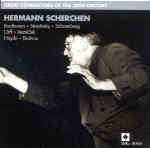Hermann Scherchen always could be counted on to deliver exciting if idiosyncratic performances of music ranging from the Baroque to the avant-garde of his day. He championed composers of the Second Vienna School–Varèse, Nono, and a host of other modernists–while also shining a new light on familiar and standard-repertoire scores. He took potboilers seriously, so that under his baton pop favorites such as Tchaikovsky’s 1812 Overture and bombastic Liszt tone poems emerged as serious works, gaining new, unsuspected stature.
The Scherchen volume in EMI’s Great Conductors of the 20th Century series hardly scratches the surface of his vast output, barely nods to his pioneering role in modern music, and doesn’t show him at his most outlandish–but that hardly dims the set’s value as an overview of a conductor whose near-cult status is amply justified. Everything here dates from 1952 to 1960, and the main focus is on the standard repertoire. Among the moderns we get a well-paced, atmospheric Stravinsky Firebird Suite, along with Schoenberg and Orff, both in tame examples of their work–the former in muddily recorded and played excerpts from the 1934 Suite for String Orchestra, the latter, Entrata, an inflation of a William Byrd piece. Absent are samples of Scherchen’s Baroque recordings–there’s no trace here of his highly individual Bach, nor of his still-entrancing Handel and Geminiani, among others.
But what we have is substantial, including as exciting (and as good) a Beethoven Eighth Symphony as you’ll ever hear, with emphatic rhythms and relentlessly driving forward motion. Scherchen opts for speed, but nothing sounds overdone. Nostalgia buffs of a certain age will recall a time when the preferred demonstration showpiece in hi-fi stores was this Westminster stereo recording of Haydn’s Symphony No. 100, the “Military”. The 1959 recording, with its loudly tinkling triangle and pounding drums, still sounds good, even if it’s no longer as revelatory as it seemed in those long-gone days.
Scherchen’s febrile Brahms First is an exciting interpretation that taxes the Viennese orchestra to its limit, but it’s compromised by squashed dynamics and thick, muddy sound that vitiates the swift opening and detracts from the beautifully shaped inner movements. But even congested sound can’t tame the whirlwind excitement Scherchen generates at the symphony’s close. Fillers are two overtures–a dramatic Beethoven Coriolan and a sparkling Donna Diana by Reznicek, full of abrupt mood shifts and sounding more substantial than usual under Scherchen’s baton.
Along with the Haydn Symphony, the Firebird and the Beethoven Eighth are the best recorded works here, sounding years ahead of their time. Engineering elsewhere is variable but adequate except for the Brahms, which seems victimized by an interventionist transfer. Now that Universal’s Westminster reissue line, with its abundance of potential Scherchen releases, appears to have been abandoned, this set becomes an even more essential purchase.
































